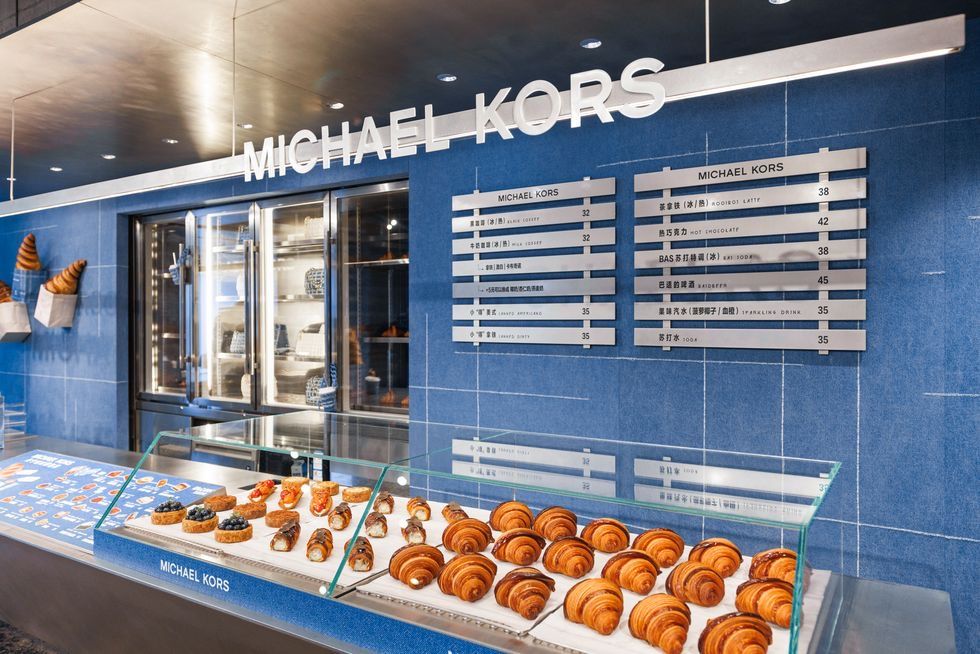To celebrate the launch of its MK denim bag collection in Shanghai, American house Michael Kors eschewed the typical evening cocktails in lieu of something a little more wholesome.
Cue a denim-clad patisserie created in collaboration with edgy pastry connoisseurs Basdban, filled with delicacies including croissants, eclairs, and Michael Kors branded coffee.
Instead of the usual glitzy snapshots you might expect from a luxury event, KOLs and fashion gurus in attendance posed in front of the pastry-decorated counters. Homegrown actress and brand ambassador Bai Lu, who was appointed as the location’s manager of the day, posted herself on Xiaohongshu holding a denim-coated pastry basket containing a giant croissant. The video raked in over 33,000 likes.

Michael Kors isn’t the first brand to tap into China’s sweet tooth with its foodie-focused pop-up. Across the mainland, the communal, relaxed appeal of the country’s bakeries has whet luxury’s appetite.
“In the big cities like Shanghai, Guangzhou, and Chengdu, I’ve noticed the local coffee shops and bakeries quickly forming their own customer communities,” John Chan, founder of Manchester and Guangzhou-based cafe-slash-retail store Greenhouse Cafe, tells Jing Daily. “I think the strategy for fashion brands is to attract these communities.”
In January, Valentino Beauty teamed up with South Korean chain Butterful & Creamorous to make over the bakery’s Shanghai flagship store. Visitors could tuck into a selection of viands, before copping some co-branded merchandise, which included paper bags, coffee cups, and pastry boxes.
Max Mara also capitalized on Butterful & Creamorous’ cultural success with its own installation last September. Diners could chow down on oversized buttery croissants and cream-filled delicacies, before quenching their thirst with a caramel latte. The campaign’s hashtag amassed over 44,000 views on Xiaohongshu.

For consumers, the appeal of the pop-ups expands beyond just tasty treats. The collabs are also satiating Gen Z’s appetite of embellishing their social media accounts with visually appetizing trends.
“China’s Gen Z consumers in particular are highly active online. They discover, consume and share content pretty much around the clock,” China community marketing specialist Kadri Karolin Kõuts tells Jing Daily. “By aligning with local bakeries, brands gain access to these influential digital spaces, where visually appealing content can quickly go viral.”
And it’s working. For instance, the hashtag #MK丹宁显眼包 (or MK denim eye-catching bag), has already received over 1.3 million views on Xiaohongshu.
In cases like Max Mara’s, the main attraction is the merch that arrives with the victuals. With the packaging outshining its edible contents, shoppers are flocking to the scene to grab themselves the co-branded memorabilia which, for Gen Z and Gen Alpha consumers, may well be their first taste of owning a luxury branded product.
“More and more consumers [in China] are turning to affordable luxury; something that won’t break the bank but is worthy of a Xiaohongshu post. These lifestyle-driven venues offer just that,” says Kõuts.

Luxury’s bakery boom is an extension of China’s guochao-rooted coffee craze from last year, where local coffee hubs became a hotspot of social media activity, spending, and socialization among consumers.
Maisons including Fendi and Louis Vuitton were quick to ride the wave. Fendi bucked the trend with its viral collaboration alongside Hey Tea, where visitors could clinch a branded paper Fendi bag for 38 RMB ($5.27), while Louis Vuitton teamed up with three local coffee chains – Manner, Metal Heads, and Plusone – on a series of travel-inspired kiosks across Shanghai.
These collaborations arrive at a time when luxury is inching ever-closer towards the hospitality industry, as experiential marketing and lifestyle choices such as “xiaozi” (petite bourgeoisie) gain traction with consumers.
Other industries are also beginning to recognise hospitality’s influence; earlier this year, urban mobility provider Niu Technologies teamed up with Tooos bakery, a domestic joint famed for its fluffy toast snacks, on an exclusive electric scooter design.
For luxury players, Chan thinks the convergence between brands and well-loved eateries is a natural fit. “It’s a great development,” he says, “especially when potential customers can spend just a few tens of yuan to buy a cup of Louis Vuitton coffee.”
